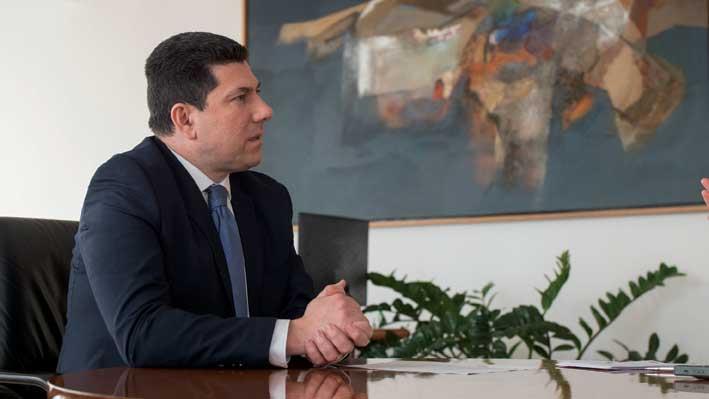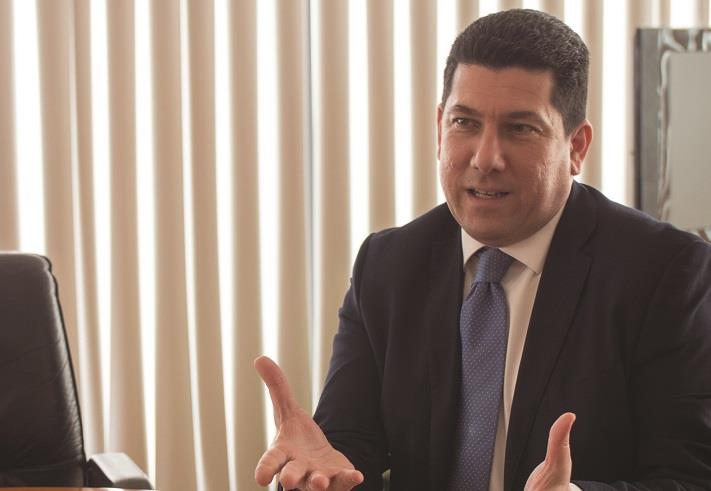We do not need corruption to build wealth and we do not need to increase the size of our population – what we need is a serious sustainable plan to provide high-end jobs for the Maltese and to decrease the importation of cheap labour, which will improve our environment and other sectors, PN Secretary General told The Malta Independent.
In an interview published today, Puli highlighted the party’s current political theme - Ġid għal Kulħadd f’Soċjetà li Jimpurtaha (Wealth for Everyone in a Caring Society) – explaining that the party is working to be of service to the whole country, not just a particular class or people. “We fully believe that every Maltese deserves the same equal rights, opportunities and to share the same responsibilities.”
He said the government is currently focusing solely on economic growth and is importing thousands of foreign workers, which brings numerous social, economic and environmental problems.
The country is suffering due to the increased population, added vehicles on the roads and waste management problems, he said. The lack of planning and the irregular build-up of the population is only the onset of huge problems which will come about in the next five to ten years, he said.
Puli argued that, at surface level society may seem to be doing well, yet there are many problems. “An EU study revealed that €750 million is being spent on corruption in Malta, money which is coming from the Maltese citizens’ pockets and that could be spent more sustainably,” he points out.

Photos Alenka Falzon
During a PN general council session on Tuesday, MP Hermann Schiavone said that members of the PN have an obligation to pull the same rope as the leader, and appeared to make a clear reference to certain MPs who do not back Delia. What is the current situation within the party?
Really, the party does not face any inner conflict and the situation is normal. Right now we have most members discussing the upcoming European Parliament elections, and there are no real forms of disagreement within the party.
In a previous interview you said that the PN will be mainly focusing on the General Elections of 2022 and you will be doing your best to ensure the party has good candidates and can present a strong focused message. Does that not mean that the party is shying away from the European Parliament or Local Council elections?
No, I believe it is thinking in a more realistic perspective. One has to look at the whole context and the work which the party has done and is doing. This year, Malta celebrates 15 years of being part of the European Union, which is thanks to the hard work of the Nationalist Party. When we say we are focusing on the General Election it is because the country needs a solid plan for the future which is based on sustainability. We are working on a number of big reforms and a report which explains the work we have done and the policies which have been planning.
We are seeing how we can become a more sustainable party, but that does not mean we are not focusing on the upcoming European Parliament elections, far from it.

So what is the core message that the party will be presenting?
The main message is that we do not need corruption to build wealth, and that there is no need to increase the population. What we do need is a serious sustainable plan to provide high end jobs for the Maltese, and to decrease the importation of cheap labour, which will improve our environment and other sectors, and ultimately improve our health.
The Party’s theme for the General Elections is Ġid għal Kulħadd f’Soċjetà li Jimpurtaha (Wealth for Everyone in a Caring Society) and we will be working to provide a service for the whole country, not just a particular class or people. We fully believe that every Maltese deserves the same equal rights, opportunities and to share the same responsibilities.
Right now the Government is focusing so much on economic growth and is importing foreign workers, which brings numerous social, economic and environmental problems. Our environment is suffering due to increased numbers, added vehicles on the road and the uncontrolled waste production. As the population increases, so does the number of flats. Our Government has increased the size of our population without even a hint of a plan on how to control this issue.
The lack of planning and the irregular population increase is only the onset of huge problems which will come about in the next five to ten years. An EU study has revealed that €750 million is being spent on corruption in Malta, money which is coming from the Maltese citizens’ pockets and that could be spent more sustainably.

This year, with Vote 16 in place, there will be many first time voters both for MEP and Local Council Elections. Yet there is still seems to be a strong sense of apathy and lack of interest in current affairs among youths. What is PN doing to tackle this issue of disheartenment?
The fact that many youths face a sense of apathy is alarming, as youths are at the age to be at the forefront of change. The party made a number of reforms about this issue as we want our youths to be aware of their potential.
Our message is clear: we want to bring a sense of solidarity amongst the nation, especially amongst youths. We have set up the Future Leader’s Programme, which trains youths from age 14 to 16 to develop political thinking. We have opened party membership to youths, who will have a say in our policy direction. The members of Future Leaders do a great job challenging us and ask important questions, and I see many of them running for the party in the next 10 years.
There are youths who are definitely interested and taking an active role in society. Not all the participants will remain in the Future Leaders Programme, and some might not even remain in the party, but the most important thing is that they are politically educated and are aware of the goings on in their country. Of course we cannot forget that there are those youths who feel alienated and a sense of solitude in society.
Malta still suffers from a high level of early school leavers, who many times do not lead a life of activism, but of solitude or at times crime. Is the party taking any initiatives as to decrease this number of early school leavers?
I am aware that there was actually a decline in the number of early school leavers between the years 2004 till 2014, which although a slow process, was still a change. Yet, there has been no change since 2014. Today, having no form of certificate makes it extremely difficult for one to gain any form of employment, and now it is even harder to find cheap labour since the Government is importing workers from abroad. Are we giving our children the necessary life skills they need to be able to work a decent job, or is the Government just relaying on foreign workers? We must maximise the possibilities for our children.
This issue mainly boils down to the education policies; what are we doing for children who might be facing certain challenges in the classroom? We need to change our policies to give these students, who might face psychological or mental challenges, the life skills they need to be able to move forward in a world of constant changes. Our education needs to open doors and not shut them. A change in educational policy is necessary, and we also need to focus what is going on inside our classrooms and the treatment of our teachers.

The Malta Union of Teachers recently released a statement regarding zero tolerance on aggressive behaviour. What more can be done to safeguard the security of our teachers?
When we speak of safeguarding we mean the protection of our teachers and children. Last year we saw the largest number of educators resigning in the past 20 years, which is alarming that so many teachers feel demoralised or unsatisfied in their jobs. This also adds another factor in the struggle of attracting new teachers to the workforce.
Teachers have a very stressful job as they have high expectations in making sure that students are prepared for a society which is radically changing and to have the necessary life skills. Why can we not create a campaign for respecting teachers? Teachers deserve the same amount of respect as our doctors and lawyers, as if the wellbeing of our educators is not up to standard; our own children will suffer too.
It is clear to see that many small issues have arisen, such as problems in the Fruit and Vegetable Scheme, Transport Scheme and replacement of teachers. All these small problems are not allowing the whole system to function properly, therefore affecting the quality of education.
Earlier this month, Adrian Delia said that the PN is interested in the quality of teaching and the mentality that you can be better by learning. What are the interests of the party to improve the current situation, especially with regards to education?
Education and health are the top priorities for an individual, and the party has made the individual the top priority. Without the individual, without their input into society, Maltese society would be nothing. That is our topmost priority and investment. We have opened numerous doors, but now we must increase our performance and work, and that is one of the many challenges we face.
One of our priorities is to upgrade the quality of teaching staff, to make sure that those educators are given the necessary support needed. The next would be to give those students who might have social, mental or psychological struggles, which could decrease their chances of finishing school, the necessary support.
We need to give those teachers and students the necessary aid they need to continue being able to work and study in a safe environment. This is what our policy makers need to do, to listen to professionals and to invest in the requested change. The party is trying to focus on education and 21st century skills for the future generations.